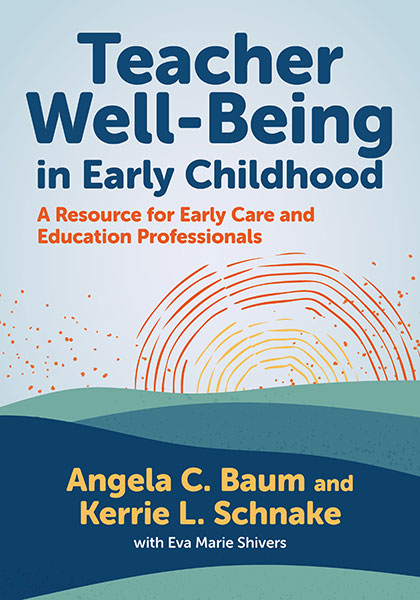Professors: Request an Exam Copy
Print copies available for US orders only. For orders outside the US, see our international distributors.
Angela C. Baum, Kerrie L. Schnake
With: Eva Marie Shivers
Publication Date: June 28, 2024
Pages: 208
Series: Early Childhood Education Series

This user-friendly book provides guidance for integrating teacher well-being content into both preservice and inservice professional learning environments.
A teacher’s well-being has a powerful impact on their work with children, families, and colleagues, and can influence the overall quality of the program in which they are employed. With a specific focus on the unique factors related to the field of early childhood care and education, this book discusses the concept of well-being and how it applies specifically to teachers of young children.
The authors provide a rationale and guidance for integrating teacher well-being content into both preservice and inservice professional learning environments. This comprehensive resource also explores the implications of, and connections between, teacher well-being, equity, and social justice. The authors share examples of well-being programs that have been implemented throughout the United States and examine the policy and practice efforts that are necessary to embed well-being culture into early care and education programs.
Book Features:
Angela C. Baum is associate dean for academic affairs and a professor of early childhood education at the University of South Carolina. Kerrie L. Schnake is the chief executive officer of the South Carolina Infant Mental Health Association.
“Angela Baum and Kerrie Schnake have crafted a thoughtful, intentional, and well-researched resource on what it means and what it takes to champion the well-being of early childhood professionals. Seeking to transform the narrative and the system, this gem of a text provides ecologically informed perspectives, useful practice connections for professionals throughout their careers, thoughtful policy directions, and an overarching lens of social justice and equity.”
—Kathleen (Kate) Gallagher, director of research and evaluation, Buffett Early Childhood Institute
Contents
Preface xi
1. Laying the Foundation: Understanding Early Childhood Teacher Well-Being 1
Key Issues Addressed in This Chapter 1
What Is Well-Being? 1
Well-Being and Early Childhood Care and Education Professionals 4
The Eight Dimensions of Wellness 6
Influences on the Eight Dimensions of Wellness 8
Our Guiding Conceptual Framework 20
Summary and Conclusions 25
2. The Importance of Teacher Well-Being 27
Key Issues Addressed in This Chapter 27
The Impact of Teacher Well-Being 27
Summary and Conclusions 42
3. Well-Being Within Early Childhood Teacher Preparation Programs 45
Key Issues Addressed in This Chapter 45
Facilitating Preservice Teachers’ Understandings of Teacher Well-Being 46
What Teacher Well-Being Is . . . and What It Isn’t 46
Understanding and Supporting the Well-Being of Preservice Teachers 49
Supporting Early Childhood Teacher Well-Being Through Effective Teacher Preparation 53
Strategies to Manage Personal Well-Being 64
Summary and Conclusions 69
4. Promoting Well-Being With Practicing Teachers 71
Key Issues Addressed in This Chapter 71
Promoting Early Childhood Educator Well-Being Across the Ecosystem 72
Relationships: The Magic Sauce in Every Well-Being Recipe 86
Well-Being Champions 91
Readiness for Change 92
Goal Setting 96
Summary and Conclusions 97
5. Learning From Others: Illustrations of Well-Being Programs and Initiatives 99
Key Issues Addressed in This Chapter 99
Supported Self-Care 100
Limited Well-Being Promotion Activities 102
Examples of Well-Being Programs for Early Childhood Educators 105
Summary and Conclusions 118
6. Wells and Frontiers: Deepening and Broadening Our Understanding of Teacher Well-Being Through the Intersectionality of Race and Gender 119
Dr. Eva Marie Shivers
Rationale 120
Framework(s) 120
History of Childcare Workers in the United States Through a Racialized Lens 123
Social and Structural Determinants of Teachers’ Well-Being 126
Attachment, Culture, and Trauma 127
Internal Processes 130
Moving From Margin to Center: How Can We Deepen and Expand Our Awareness of Teacher Well-Being? 131
Spirituality—Black Liberation Theology 132
Conclusion: A Call to Decolonize Our Understanding and Support of Teacher Well-Being 132
7. Where Do We Go From Here?: Considerations for Policy and Practice 135
Key Issues Addressed in This Chapter 135
Education, Penalties, and Myths 137
Fair Compensation and the Burden of Early Childhood Education Costs 142
Regulations, Standards, and Measures of Quality 144
Societal Perceptions of Young Children and Early Childhood Educators 148
Summary and Conclusions 153
References 155
Index 179
About the Authors and Contributor 189
Professors: Request an Exam Copy
Print copies available for US orders only. For orders outside the US, see our international distributors.